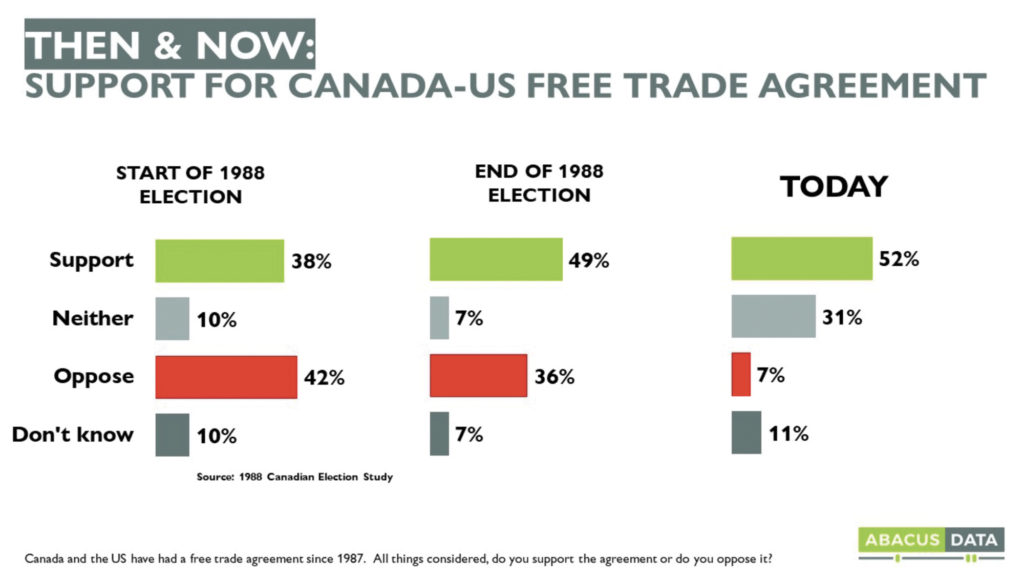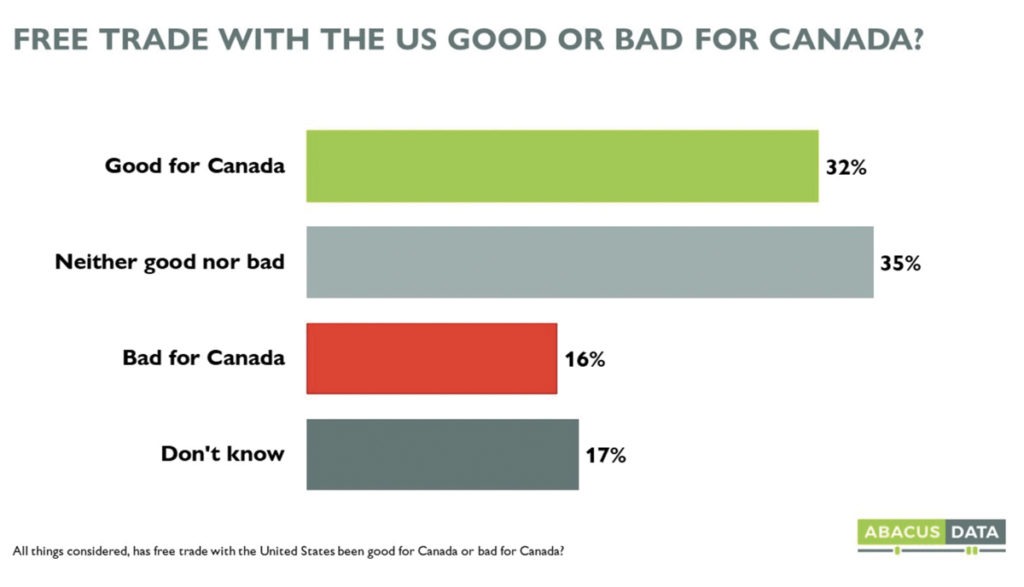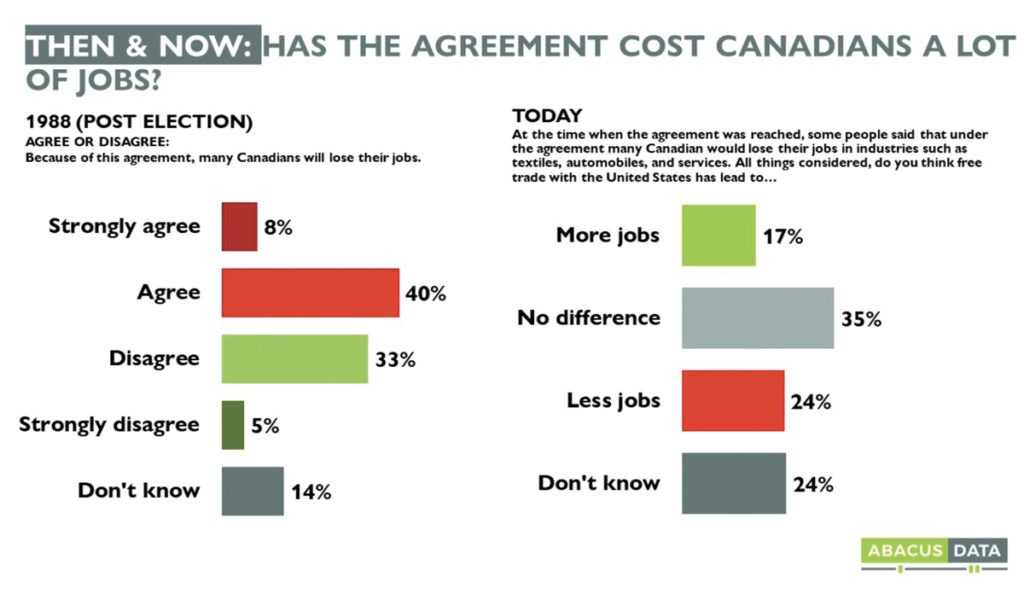Free Trade at 35: Canadian Public Opinion, Then and Now
David Coletto
When the Macdonald Commission on the Economic Union and Development Prospects for Canada recommended free trade with the United States in1985, an Environics Research survey found that two-thirds of Canadians supported the idea. But over time, support declined, and opposition increased.
When Prime Minister Brian Mulroney called a federal election on October 1, 1988, after the Liberals used their majority in the Senate to block ratification of the Canada-US Free Trade Agreement, the November 21st election outcome was far from certain. A Gallup poll published two days after the election call showed Mulroney’s Progressive Conservatives ahead by 10 points at 43 percent to 33 for John Turner’s Liberals, with Ed Broadbent’s NDP at 22. By November 5th, Gallup showed the numbers for the key clash on free trade between Mulroney in favour and Turner against essentially flipped, with the Liberals at 43 and the Tories at 31. On November 12th, Gallup showed a dead heat — 35 to 35. In the end, Mulroney’s Progressive Conservatives and the FTA won with 43 percent to 32 percent for the Liberals, and the NDP at 20 percent. Despite support for free trade higher than opposition, a PC victory was by no means guaranteed – although a pretty good bet in hindsight given that both major opposition parties were against the agreement.
 Free trade dominated the election campaign – both in terms of the argument being litigated by Mulroney and Turner with back-up from Broadbent, in media coverage and in what voters said was the top issue impacting their vote. According to the 1988 Canadian National Election Study, a survey conducted several political scientists and lead by UBC professor Richard Johnston during and after the election, Canadians were almost evenly split on free trade with the United States when the election started. Few didn’t have a view on the issue. The country was fairly polarized, and opinions were deeply held.
Free trade dominated the election campaign – both in terms of the argument being litigated by Mulroney and Turner with back-up from Broadbent, in media coverage and in what voters said was the top issue impacting their vote. According to the 1988 Canadian National Election Study, a survey conducted several political scientists and lead by UBC professor Richard Johnston during and after the election, Canadians were almost evenly split on free trade with the United States when the election started. Few didn’t have a view on the issue. The country was fairly polarized, and opinions were deeply held.
By the end of the 1988 election campaign, views had shifted. Support for free trade increased by 11-points to 49 percent while opposition decreased by 8 points to 36 percent. Those who were indifferent or unsure dropped by 6 points. Only 14 percent of Canadians at the time were unsure or didn’t have a position on the issue.
More striking was the partisan divide on the issue. At the start of the campaign, PC voters were almost seven times more likely to support free trade than those voting Liberal or NDP. By the end of the campaign, those partisan divides increased even more with almost all PC voters (86 percent) supporting free trade with the United States compared with only around one in five Liberal and NDP supporters.
So where do we stand today, 35 years after completion of the Canada-US FTA talks in October 1987? According to a new poll conducted by my firm, Abacus Data, opposition to free trade with the United States stands in the single digits. Only 7 percent today are opposed compared to half (52 percent) who say they support it.
Support for free trade is fairly consistent across the country with a narrow band of 12 percentage points separating Albertans who are most in favour (58 percent) and Quebecers who are less likely to support free trade with the US (46 percent).
There’s also a generational consensus. A clear plurality or majority of younger and older Canadians support free trade with the United States although those who were politically conscious during the debate in the 1980s are more likely to support free trade with the US and less likely to be indifferent or unsure about it than those not around or politically unaware during that time.
Most important however, is that today, there is little partisan division on free trade with the United States. A majority, or close to a majority, of Liberal, Conservative, New Democratic, and Bloc voters support bilateral free trade. Even a plurality of Green Party and People’s Party voters support free trade between Canada and the United States.
This near-consensus across party supporters reflects the actual consensus among the political class in Canada. While differences of opinion around trade with the United States exist on the margins, you never hear our political leaders talking about scrapping free trade with the United States.
 But the real story in the data, in my view, isn’t that support for free trade with the US is essentially the same as it was when the question was debated and settled in 1988 or that a tiny minority of Canadians today are opposed to it. It’s the seeming indifference to Canada-US free trade that exists among close to half of Canadians. ider these other findings from the survey:
But the real story in the data, in my view, isn’t that support for free trade with the US is essentially the same as it was when the question was debated and settled in 1988 or that a tiny minority of Canadians today are opposed to it. It’s the seeming indifference to Canada-US free trade that exists among close to half of Canadians. ider these other findings from the survey:
- 1 in 3 Canadians believe that free trade with the US has made no difference to the strength of the Canadian economy. 41 percent think the Canadian economy is better off while 27 percent think it is worse off.
- Almost 4 in 10 Canadians believe that Canada-US free trade has made no difference to our relationship with the United States.
- 52 percent either believe free trade with the United States has been neither good nor bad for Canada overall or don’t know.
For too long, business, policy, and political leaders have assumed that Canadians are a free-trading people. We assume that the Canadian public understands that as a smallish country blessed with an enormous quantity of natural resources, free trade is our ticket to prosperity even while our largest trading partner is increasingly protectionist, and the UK exits the largest common market in the world.
When asked whether free trade with the United States has benefited Canada or the US more, 45 percent believe the US has benefited more, 10 percent think Canada has, while 27 percent think both countries have benefited equally. Almost 1 in 5 aren’t sure.
 When asked whether free trade with the United States has led to more jobs or less jobs for Canadians, 1 in 4 say they don’t know, 35 percent think it’s made no difference and more think free trade has ultimately led to fewer jobs in Canada than more jobs.
When asked whether free trade with the United States has led to more jobs or less jobs for Canadians, 1 in 4 say they don’t know, 35 percent think it’s made no difference and more think free trade has ultimately led to fewer jobs in Canada than more jobs.
If those findings are not a warning signal that Canadian public opinion on free trade is vulnerable to elite persuasion, then I don’t know what is. For those who believe free trade with the United States is essential to Canada’s economic well-being, don’t forget to engage the public regularly on the merits of the deal.
Complacency leads to indifference which can create opportunities for political entrepreneurs to leverage that indifference into opposition, misunderstanding, or worse.
Thirty-five years after the Canada-US Free Trade Agreement took effect, opposition to the agreement has all but disappeared. There are few divisions politically, regionally, or generationally. But growing indifference to Canada-US free trade is its greatest threat today, especially when more and more Canadians feel threatened by changes in the economy and the United States moves increasingly in a protectionist direction.
Dr. David Coletto is founder and CEO of Ottawa and Toronto-based Abacus Data. He is also an adjunct professor at the Arthur Kroeger College of Public Affairs where he teaches in the graduate program on political management.
